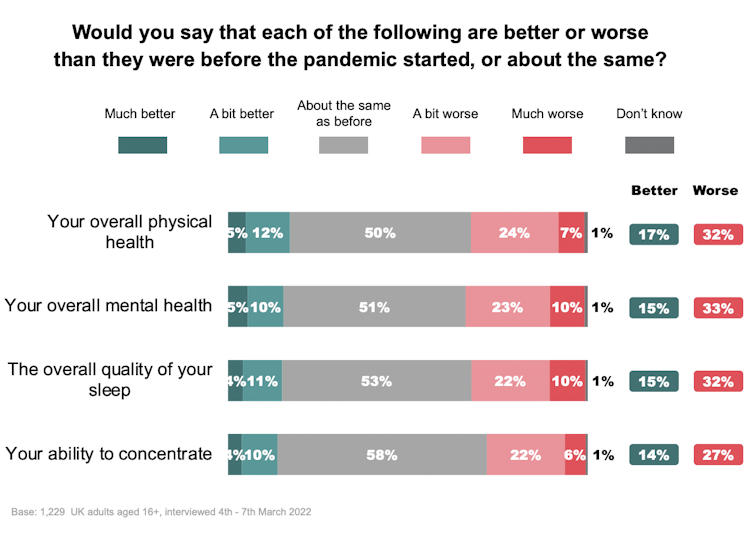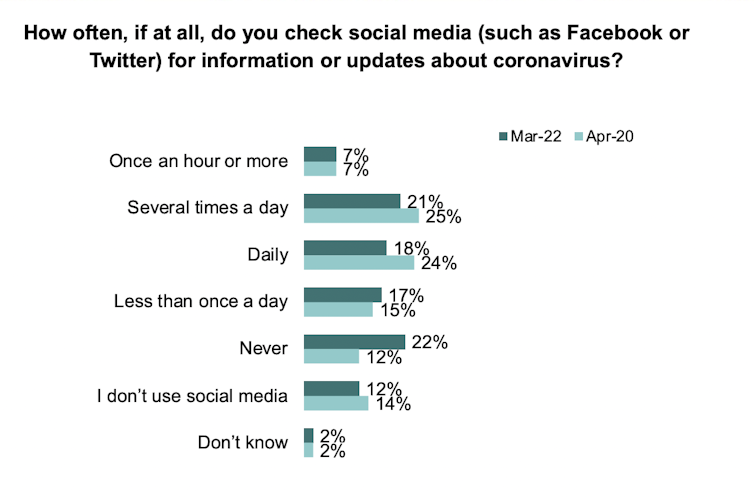
Two years on from the first pandemic lockdown in the UK, a new study by King’s College London and Ipsos MORI shows just how damaging COVID and the measures to control it have been.
In a representative sample of just over 1,200 people, a third of people say they’re lonelier and sleeping less well than before the pandemic. Nearly half are seeing friends less and leaving home less – and half are spending more time on screens. It’s no surprise, then, that a third of people feel their mental or physical health is worse.
And, as with so much in the pandemic, some groups are feeling the effects much more keenly, with the young and women more likely to experience many of these negative impacts. For example, 42% of 16-34-year-olds and 38% of women say their mental health is worse than before the pandemic.

Of course, these worrying effects will not all be due to the pandemic and lockdowns. The cost of living crisis is already starting to bite, and a war in Europe is no doubt adding to our malaise. We also need to bear in mind that people always tend to think things are going downhill. We’re prone to what the social psychologists call “rosy retrospection”, where we forget the bad from the past. This can be a useful psychological tic to protect us from dwelling on things we can’t change, but it can also make the present feel worse than it is.
However, many are clearly suffering, and the pandemic has undoubtedly played a key role in shaking both our personal connections and faith in institutions we deeply rely on. We can see that in our views of the NHS. Two-thirds of people (correctly think) waiting times and access to GP appointments are worse than before the pandemic.
Over half think that the quality of health and social care has declined, alongside the wellbeing of NHS staff. And we attribute the bulk of this impact directly to the pandemic, with people particularly likely to believe it has taken a toll on NHS staff.
Support for the government response
Despite all this, a clear pattern in all of our studies has been that large proportions of the public were, and remain, supportive of more restrictive measures than the government has pursued. The government was rated lowest by the public in late 2020, when it was felt that things were opening up too quickly. Now, the ratings of the UK government on its handling of the crisis are approaching the most positive we’ve seen since the start of the pandemic.
Though restrictions are now largely lifted, most of us don’t think the pandemic is entirely over. Only one in five hold that view, while, at the other end of the spectrum, a quarter think life will never return to “normal” or say we have no idea when it will.
Despite everything else that’s causing us concern now, the pandemic is still deeply affecting many of us. That’s clear from one of the most surprising results from the study, on how often people are checking social media for information on COVID-19. Back in April 2020 a third of people were checking several times a day, which was perhaps understandable – but it’s hardly any different today, despite all our other pressing concerns.

The societal impact of the pandemic mirrors how variable the effects of the virus are on individuals, with some relatively lightly touched and others really suffering. For many of us, the full effects are still revealing themselves, and that means, for society as whole, we’re only at the start of a long road back.
Bobby Duffy receives funding from the ESRC, Cabinet Office, British Academy, the EC H2020 programme, Unbound Philanthropy and the Barrow Cadbury Trust.
This article was originally published on The Conversation. Read the original article.



.png?w=600)



